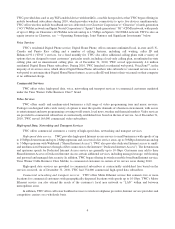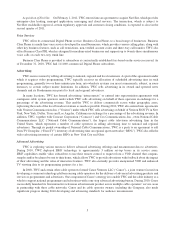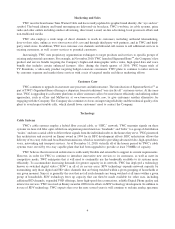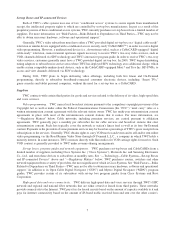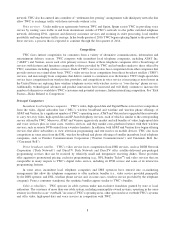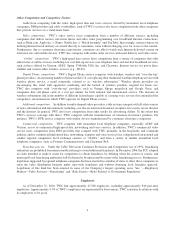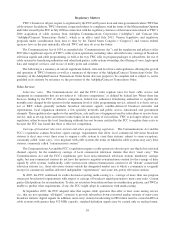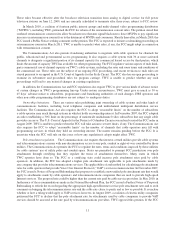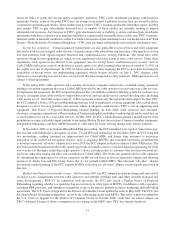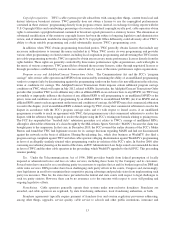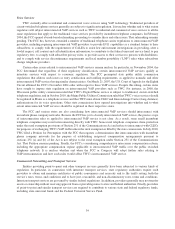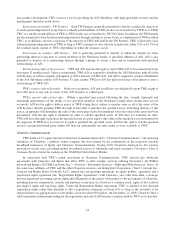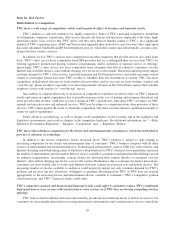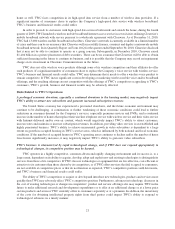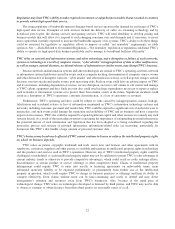Time Warner Cable 2010 Annual Report Download - page 26
Download and view the complete annual report
Please find page 26 of the 2010 Time Warner Cable annual report below. You can navigate through the pages in the report by either clicking on the pages listed below, or by using the keyword search tool below to find specific information within the annual report.indemnity bonds. The terms and conditions of cable franchises vary from jurisdiction to jurisdiction. The
Communications Act provides protections against many unreasonable terms. In particular, the Communications Act
imposes a ceiling on franchise fees of five percent of revenues derived from cable service. TWC generally passes the
franchise fee on to its subscribers, listing it as a separate item on the bill.
Franchise agreements usually have a term of ten to 15 years from the date of grant, although some renewals may be
for shorter terms. Franchises usually are terminable only if the cable operator fails to comply with material provisions.
TWC has not had a franchise terminated due to breach. After a franchise agreement expires, a local franchising authority
may seek to impose new and more onerous requirements, including requirements to upgrade facilities, to increase channel
capacity and to provide various new services. Federal law, however, provides significant substantive and procedural
protections for cable operators seeking renewal of their franchises. In addition, although TWC occasionally reaches the
expiration date of a franchise agreement without having a written renewal or extension, TWC generally has the right to
continue to operate, either by agreement with the local franchising authority or by law, while continuing to negotiate a
renewal. In the past, substantially all of the material franchises relating to TWC’s systems have been renewed by the
relevant local franchising authority, though sometimes only after significant time and effort.
In June 2008, the U.S. Court of Appeals for the Sixth Circuit upheld regulations adopted by the FCC in December
2006 intended to limit the ability of local franchising authorities to delay or refuse the grant of competitive franchises (by,
for example, imposing deadlines on franchise negotiations). The FCC has applied most of these rules to incumbent cable
operators which, although immediately effective, in some cases may not alter existing franchises prior to renewal.
At the state level, several states, including California, Kansas, Missouri, North Carolina, Ohio, South Carolina, Texas
and Wisconsin, have enacted statutes intended to streamline entry by additional video competitors, some of which provide
more favorable treatment to new entrants than to existing providers. Similar bills are pending or may be enacted in
additional states. Despite TWC’s efforts and the protections of federal law, it is possible that some of TWC’s franchises
may not be renewed, and TWC may be required to make significant additional investments in its cable systems in response
to requirements imposed in the course of the franchise renewal process. See “—Competition—Other Competition and
Competitive Factors—Franchise process.”
High-speed Internet Access Services
TWC provides high-speed data services over its existing cable facilities. In 2002, the FCC released an order in which it
determined that cable-provided high-speed Internet access service is an interstate “information service” rather than a “cable
service” or a “telecommunications service,” as those terms are defined in the Communications Act. That determination was
sustained by the U.S. Supreme Court. The “information service” classification means that the service is not subject to regulation
as a cable service or as a telecommunications service under federal, state or local law. Nonetheless, TWC’s high-speed Internet
access service is subject to a number of regulatory requirements, including the Communications Assistance for Law
Enforcement Act (“CALEA”), which requires that high-speed data providers implement certain network capabilities to
assist law enforcement agencies in conducting surveillance of criminal suspects.
“Net neutrality” legislative proposals and regulations. Over the past several years, disparate groups have adopted
the term “net neutrality” in connection with their efforts to persuade Congress and regulators to adopt rules that could limit
the ability of broadband providers to effectively manage or operate their broadband networks. In previous Congressional
sessions, legislation was introduced proposing “net neutrality” requirements, which would have limited to a greater or
lesser extent the ability of high-speed Internet access service providers to adopt pricing models and network management
policies. Similar legislation was introduced in the most recent session, as well as legislation to prevent the FCC from
adopting any net neutrality rules.
In September 2005, the FCC issued its Net Neutrality Policy Statement, which at the time, the agency characterized
as a non-binding policy statement. The principles contained in the Net Neutrality Policy Statement set forth the FCC’s
view that consumers are entitled to access and use lawful Internet content and applications of their choice, to connect to
lawful devices of their choosing that do not harm the broadband provider’s network and to competition among network,
application, service and content providers. The Net Neutrality Policy Statement notes that these principles are subject to
“reasonable network management.” Subsequently, the FCC made these principles binding as to certain
telecommunications companies for specified periods of time pursuant to “voluntary commitments” in orders adopted
in connection with mergers undertaken by those companies.
14


